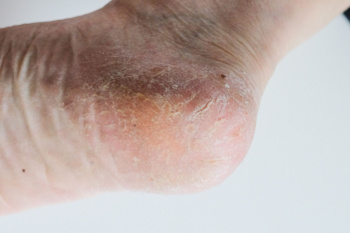
Dry skin on the feet and cracked heels can be uncomfortable and sometimes painful. Lack of moisture is a common cause, as the feet have fewer oil glands compared to other parts of the body. Standing for long periods, wearing open-backed shoes, and walking barefoot can increase the risk of dryness and thickened skin. Risk factors include aging, obesity, and prolonged exposure to harsh weather conditions. Certain medical conditions, such as diabetes, eczema, and thyroid disorders, can also contribute to excessive dryness and cracking. If left untreated, deep cracks may develop, increasing the risk of infection. If you have cracked heels, it is suggested that you consult a podiatrist who can treat this uncomfortable condition, which may include prescribed medication.
If the skin on your feet starts to crack, you may want to see a podiatrist to find treatment. If you have any concerns, contact Patrick Bruton, DPM from Big Country foot and Ankle. Our doctor can provide the care you need to keep you pain-free and on your feet.
Cracked Heels
It is important to moisturize your cracked heels in order to prevent pain, bleeding, and infection. The reason cracked heels form is because the skin on the foot is too dry to support the immense pressure placed on them. When the foot expands, the dry skin on the foot begins to split.
Ways to Help Heal Them
- Invest in a good foot cream
- Try Using Petroleum Jelly
- Ease up on Soaps
- Drink Plenty of Water
Ways to Prevent Cracked Heels
- Moisturize After Showering
- Skip a Shower
- Keep Shower Water Lukewarm
- Don’t Scrub Your Feet
If you are unsure how to proceed in treating cracked heels, seek guidance from a podiatrist. Your doctor will help you with any questions or information you may need.
If you have any questions, please feel free to contact our offices located in Abilene, and Brownwood, TX . We offer the newest diagnostic and treatment technologies for all your foot care needs.

Walking aids can help patients with foot, toe, or ankle conditions by improving stability and decreasing the risk of falling. Canes, including single-point and quad canes, provide support for those with mild to moderate balance issues or weakness. Crutches are useful for keeping weight off an injured foot or ankle, but require upper body strength. Walkers offer greater support and are beneficial for patients with significant balance concerns. Rollators, which have wheels and hand brakes, allow for easier movement while preventing a sudden loss of balance. Additionally, knee walkers help patients recovering from ankle injuries or surgery by enabling mobility without placing weight on the affected limb. Choosing the wrong walking aid, or using one that is not properly adjusted, can add to instability. A podiatrist can assess your foot and ankle condition, determine whether a walking aid is needed, and recommend the most appropriate option to improve stability and prevent falling. If you need a walking aid to help with balance issues, it is suggested that you schedule an appointment with a podiatrist for advice.
Preventing falls among the elderly is very important. If you are older and have fallen or fear that you are prone to falling, consult with Patrick Bruton, DPM from Big Country foot and Ankle. Our doctor will assess your condition and provide you with quality advice and care.
Every 11 seconds, an elderly American is being treated in an emergency room for a fall related injury. Falls are the leading cause of head and hip injuries for those 65 and older. Due to decreases in strength, balance, senses, and lack of awareness, elderly persons are very susceptible to falling. Thankfully, there are a number of things older persons can do to prevent falls.
How to Prevent Falls
Some effective methods that older persons can do to prevent falls include:
- Enrolling in strength and balance exercise program to increase balance and strength
- Periodically having your sight and hearing checked
- Discuss any medications you have with a doctor to see if it increases the risk of falling
- Clearing the house of falling hazards and installing devices like grab bars and railings
- Utilizing a walker or cane
- Wearing shoes that provide good support and cushioning
- Talking to family members about falling and increasing awareness
Falling can be a traumatic and embarrassing experience for elderly persons; this can make them less willing to leave the house, and less willing to talk to someone about their fears of falling. Doing such things, however, will increase the likelihood of tripping or losing one’s balance. Knowing the causes of falling and how to prevent them is the best way to mitigate the risk of serious injury.
If you have any questions, please feel free to contact our offices located in Abilene, and Brownwood, TX . We offer the newest diagnostic and treatment technologies for all your foot care needs.

Congenital vertical talus, or rocker bottom foot, is a rare condition that affects foot structure from birth. This deformity occurs when the talus bone is improperly positioned, causing the foot to curve abnormally and point upward. The arch appears excessively convex, and the sole may have a rounded shape, making it difficult for your baby’s foot to bear weight properly. Unlike flexible flatfoot seen in newborns, congenital vertical talus leads to stiffness and instability that often requires medical intervention. It is frequently linked to neuromuscular or genetic disorders, and, in some cases, improper positioning in the womb may contribute to its development. A diagnosis is made through a physical examination and confirmed with X-rays, which reveal a misaligned talonavicular joint. While casting may be attempted in early infancy to improve alignment, surgery may be required to reposition the bones and restore function. A podiatrist can assess the condition, discuss treatment options, and provide extended follow-up care. If your baby has a congenital foot deformity, it is suggested that you schedule an appointment with a podiatrist for an exam, diagnosis, and treatment options.
Congenital foot problems require immediate attention to avoid future complications. If you have any concerns, contact Patrick Bruton, DPM of Big Country foot and Ankle. Our doctor can provide the care you need to keep you pain-free and on your feet.
Congenital foot problems are deformities affecting the feet, toes, and/or ankles that children are born with. Some of these conditions have a genetic cause while others just happen. Some specific foot ailments that children may be born with include clubfeet, polydactyly/macrodactyly, and cleft foot. There are several other foot anomalies that can occur congenitally. What all of these conditions have in common is that a child may experience difficulty walking or performing everyday activities, as well as trouble finding footwear that fits their foot deformity. Some of these conditions are more serious than others. Consulting with a podiatrist as early as possible will help in properly diagnosing a child’s foot condition while getting the necessary treatment underway.
What are Causes of Congenital Foot Problem?
A congenital foot problem is one that happens to a child at birth. These conditions can be caused by a genetic predisposition, developmental or positional abnormalities during gestation, or with no known cause.
What are Symptoms of Congenital Foot Problems?
Symptoms vary by the congenital condition. Symptoms may consist of the following:
- Clubfoot, where tendons are shortened, bones are shaped differently, and the Achilles tendon is tight, causing the foot to point in and down. It is also possible for the soles of the feet to face each other.
- Polydactyly, which usually consists of a nubbin or small lump of tissue without a bone, a toe that is partially formed but has no joints, or an extra toe.
- Vertical talus, where the talus bone forms in the wrong position causing other bones in the foot to line up improperly, the front of the foot to point up, and the bottom of the foot to stiffen, with no arch, and to curve out.
- Tarsal coalition, when there is an abnormal connection of two or more bones in the foot leading to severe, rigid flatfoot.
- Cleft foot, where there are missing toes, a V-shaped cleft, and other anatomical differences.
- Macrodactyly, when the toes are abnormally large due to overgrowth of the underlying bone or soft tissue.
Treatment and Prevention
While there is nothing one can do to prevent congenital foot problems, raising awareness and receiving neonatal screenings are important. Early detection by taking your child to a podiatrist leads to the best outcome possible.
If you have any questions please feel free to contact our offices located in Abilene, and Brownwood, TX . We offer the newest diagnostic tools and technology to treat your foot and ankle needs.

